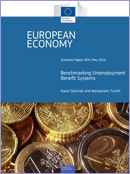|
|
|
|
|
|
|
|
 |
 |
 |
 |
Commission to propose conditionality for Spanish financial sector
In a joint statement issued on 9 June, President of the European Commission José Manuel Barroso and Vice-President Olli Rehn said that the Commission is ready to propose “appropriate conditionality” for Spain’s financial sector. The two officials said that the European Commission would work in close liaison with the European Central Bank (ECB), European Banking Authority (EBA) and the International Monetary Fund (IMF). The statement was a response to the expression by Spain of its intention to request the support of the euro area for the restructuring of its financial sector, and the positive response to this by the Eurogroup of euro area finance ministers. The exact amount of support will be specified based on a diagnostic exercise commissioned by the Spanish authorities but is currently estimated at up to EUR 100 billion in total.
|
 |
 |
 |
|
 |
 |
 |
 |
 |
|
 |
 |
 |
With this thorough restructuring of the banking sector, together with the on-going determined implementation of structural reforms and fiscal consolidation, we are certain that Spain can gradually regain the confidence of investors and market participants and create the conditions for a return to sustainable growth and job creation.
Olli Rehn, European Commission Vice-President for Economic and Monetary Affairs and the Euro
|
 |
|
|
|
 |
 |
 |
 |
G20 Leaders demonstrate unity, support euro area in Los Cabos
The G20 summit took place in Mexico on 18-19 June, the day after the elections in Greece. The euro area once again was very much at the centre of the discussions. G20 Leaders sent a strong message of support for the EU crisis response and the integrity of the euro area. They adopted the "Los Cabos Action Plan for Growth and Jobs" with contributions from all areas of the world; confirmed and finalised the agreement reached in Washington in April to increase IMF resources, resulting in an overall increase of USD 456 billion; and reaffirmed that financial market reform will remain on top of the G20 agenda going forward.
|
 |
|
 |

|
|
 |
 |
 |
 |
Following Greek election, Barroso and Van Rompuy reaffirm EU support
In a joint statement on 17 June, José Manuel Barroso, President of the European Commission, and Herman Van Rompuy, President of the European Council, welcomed the election result and said they would “continue to stand by Greece as a member of the EU family and of the Euro area.” The two leaders underlined the importance of the second economic adjustment programme agreed between Greece and the Eurogroup as “the basis upon which to build to foster growth, prosperity and jobs for the Greek people.” On 14 March, euro area finance ministers had approved this programme for an amount of up to EUR 130 billion until 2014 following signature of a Memorandum of Understanding on the same day between Greece and the Commission acting on behalf of the euro area Member States.
|
 |
|
 |

|
|
 |
 |
 |
 |
EU and euro area trade balances improve
The EU and euro area trade in goods balances improved in April 2012 compared with the previous year, according to figures released by Eurostat on 15 June. The euro area had a EUR 5.2 billion trade surplus in goods with the rest of the world, compared with a EUR 4.5 billion deficit in April 2011. Seasonally adjusted exports fell in April 2012by 1.3% and imports by 3.0% compared with the previous month. Eurostat estimated the April 2012 extra-EU trade in goods balance at EUR -12.0 billion euro, compared with -17.2 billion in April 2011. Seasonally adjusted exports fell by 1.8% and imports by 2.2% in April 2012 compared with the previous month.
|
 |
|
 |

|
|
 |
 |
 |
 |
Barroso argues for EU budget, backed by European Parliament
Appearing before the European Parliament on 13 June, President of the European Commission José Manuel Barroso said: “We need to dispel the myth that the EU budget is a budget for ‘Brussels’, for the EU structures or institutions. No – the EU budget is money for our regions, our cities, our rural areas.” Barroso asserted that targeted public investment through thebudget was necessary to complement structural reforms and ensure growth. He argued against cuts proposed by some Member States, saying that they are so miniscule as a proportion of the EU’s GDP that they would certainly “not make or break sound public finances in Europe!” The European Parliament broadly supports the Commission’s spending plan, which is encapsulated in the multiannual financial framework (MFF) for 2014-2020 proposed by the Commission on 29 June 2011.The MFF, focusing on priority funding at the EU level that provides true added value, proposes €1,025 billion in commitments (1.05% of the EU gross national income (GNI) and €972.2 billion (1% of EU GNI) in payments. The European Council is scheduled to hold its first discussion on the MFF at the 28 – 29 June summit.
|
 |
|
 |

|
|
|
|
 |
 |
 |
 |
The economic impact of the Services Directive: A first assessment following implementation. European Economy.Economic Papers.456. June 2012.
This paper estimates the economic impact of the actual implementation of the Services Directive across Member States based on new data on the barriers to cross-border provision and to establishment. It is still, however, based on an extrapolation exercise, because the period following the implementation of the Directive is too short to yield sufficient data. The study estimates the impact at the EU level of barrier reduction at 0.8% of GDP, with 80% of the gains reaped within the first five years following barrier reduction. Unlike previous studies, this study takes into account the domestic impact of barrier reductions on labour productivity, concluding that Member States can still derive additional benefits from the Directive if they continue their reform efforts. Similarly, it finds that Member States can capture additional gains by setting up or improving national Points of Single Contact (PSC) to spur administrative simplification.
|
|
 |

|

|
|
|
|
|
|
|
|
|
|
|
|
|
|

|
|
Directorate-General for Economic and Financial Affairs
|

|